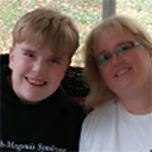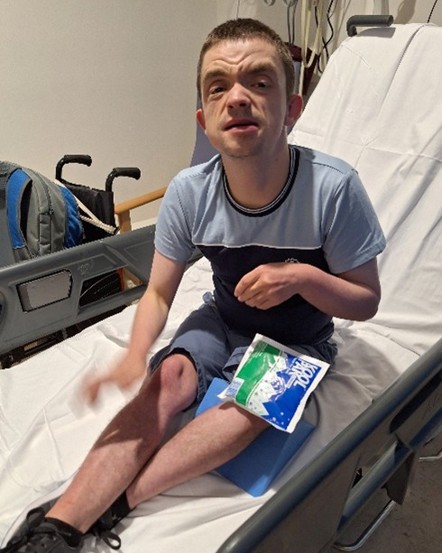Don’t Talk with Your Mouth Full!

Tina McGrevy
Tina McGrevy lives in the Midwest with her husband Charlie and their three sons: Garrett diagnosed in 2001 with Smith-Magenis Syndrome (SMS), Patrick ...
There was a time when I could not imagine I would ever say this to him.
Garrett began speech therapy before he was two years old, right after we received his diagnosis of Smith-Magenis syndrome (SMS). Speech delays are a common symptom in children born with SMS.
“I wamp, wamp, wamp!”
He used to choke so easily. From a young age, soft baby food like applesauce would cause him to gag.
By the time he was five, my husband and I were experts in the Heimlich maneuver. He never had a lot of interest in eating.
He would drink enough milk to float a ship, but we could not get much real food in him. I assumed that was because he had such trouble swallowing.
We bought fortified drinks like Boost to make certain he was receiving enough necessary nutrition.
“No!” I looked over at Garrett from my usual spot in front of the dishwasher. “You cannot talk until your mouth is empty.” And now, in the teenage years, meals at our table resemble feeding time at the trough.
In the early days, I would take Garrett to one of his different therapies: speech, physical and occupational each week.
It wasn’t too difficult at first.
When Garrett was two, our second son Patrick was born. We had to purchase a double stroller because Garrett was still so wobbly on his feet. “I wamp wilk.”
At first, the speech therapist just worked on trying to get Garrett to blow…blowing bubbles from a wand and blowing pieces of paper across the table with a straw.
“Your mouth still has food in it.” After our third son Brennan was born, juggling three kids in a two seat stroller was a real circus act.
But, I dragged all three of them in and out of the therapy appointments; hoping that all the exercises and activities would help Garrett to reach his full potential.
Another struggle we had was getting him to brush his teeth.
Garrett was very defensive when it came to anything touching his mouth. At the end of each speech therapy session, the therapist would put on a glove and massage the inside of his mouth. Garrett hated that! And I do mean HATED! “I ed I wamp wilk!” I had enough.
I put my dishcloth down and stood over Garrett’s chair. “I said you cannot talk with your mouth full of food. It is rude. And gross. Do NOT say another word with your mouth until it is empty!” I turned back around just as Garrett knocked on the table.
I spun back towards him prepared to begin a real LONG lecture.
And just then, Garrett pulled out another activity the speech therapist taught him: sign language. “I” ….he signed the letter “i” up to his chest. “Want”…his very first sign. I believe it took him all of 3 seconds to learn it. “More”…I had completely forgotten this sign.
We had not used it in almost a decade. “Milk”…this sign is the motion one would make while milking a cow.
And Garrett makes it with all the gusto of “eight maids a-milking”.
“Please”…we had not learned the sign for please.
What a statement of our parenting! But, once Garrett began talking, we did teach him the phrase “I want” always ended with “please”. Since he could not speak, Garrett made up his own sign for please: he clasped his hands in a begging motion and held them under his chin.
“Well, he didn’t say another word,” Patrick walked by just in time to point out the obvious.
What else could I do? I filled up his glass. “Thank you,” Garrett signed. “You’re so welcome,” I answered.


